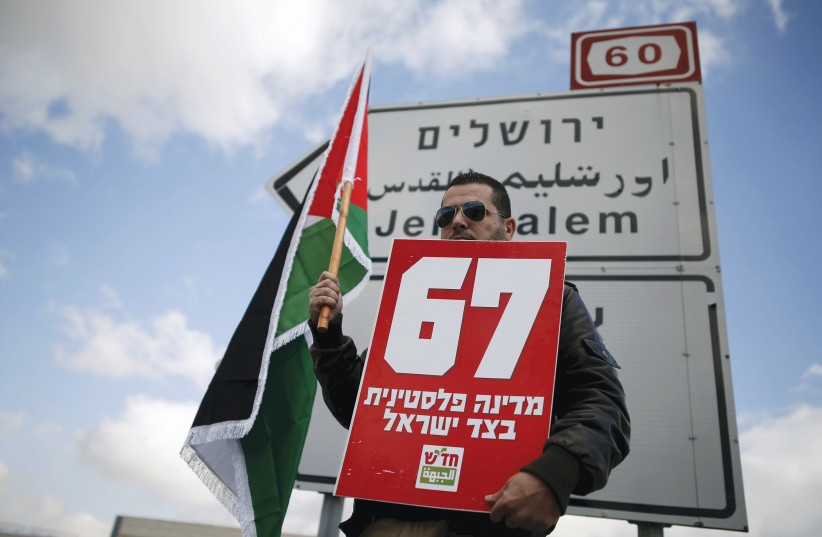Theoretically, an American senator calling for Israeli elections is meaningless, whereas an Israeli general challenging Israel’s politicians threatens democracy.
Nevertheless, many of us felt threatened by Sen. Charles Schumer’s intrusion into Israeli politics – fearing it helped Democratic fence-sitters abandon Israel. Simultaneously, many Israelis applauded Brig.-Gen. Dan Goldfus for demanding that Israel’s leaders prove “worthy” of our amazing soldiers. Disciplined enough not to mention names, Goldfus expressed our feelings, boldly, constructively.
It’s all about timing. With US-Israel relations increasingly wobbly, having America’s highest elected Jewish official join the pile-on hurts. Yet having a war hero demand the kind of leadership we deserve was more inspiring than unnerving. It reflected a widespread frustration with the Mummy of Balfour Street, who fails to understand that wars can be won by soldier-heroes, then lost by scaredy-cat politicians ducking “day after” plans, shilly-shallying to preserve their rickety coalition.
Chuck Schumer repeated the tiresome call for a “two-state solution,” mocking his claim that Netanyahu’s “governing vision” is the one “stuck in the past.” Five months after October 7, how can intelligent people resurrect the two-state solution delusion, without updates or nuance? It rewards the Palestinians’ calls to “globalize the intifada” against Israel, while ignoring their incessant one-state solution cries: “from the River to the Sea!” And it ignores the 1,000 Israelis terrorists murdered thanks to the 1990s’ Oslo peace process, and the 1,200-plus Hamas murdered thanks to Israel’s 2005 Disengagement from the Gaza Strip.
A responsible Israeli leader would lead creatively – not just to please the Americans today but to protect Israel tomorrow. Instead of shutting up, pretending the Palestinian problem will disappear, why not propose “two democracies for two peoples”?

The shift is seismic, not semantic. The Gaza Disengagement catastrophe highlights the “two states for two peoples” problem. The slogan assumes that if Israel carved out just enough from its one, small, New-Jersey-sized state, the poor, stateless, oppressed Palestinians would be satisfied. Perpetually putting the onus on Israel ignores the pro-Palestinian movement’s exterminationist plans for Jews, not just Israelis.
Hamas, in particular, was not satisfied with getting all of Gaza. The Hamas charter endorses permanent jihad against Israel. What kind of arrangement would satisfy these mass murderers?
Making mistakes politically is excusable; refusing to learn from them is inexcusable.
The West treats this conflict as a rational border dispute. Yet most Palestinian leaders see their fight against Israel in apocalyptic, existential, terms. They’re trying to wipe Israel off the map, not redraw boundaries.
Similarly, in 2000, when prime minister Ehud Barak made such sweeping concessions at Camp David to the Palestinians that most Israelis bridled, Yasser Arafat, the arch terrorist, didn’t even make a counteroffer.
Any solution requires drastic changes in Palestinian political culture
DEMANDING “TWO democracies for two peoples” requires changes in Palestinian political culture as dramatic as Israel’s expected concessions – and before Israel risks its security, again. Prof. Irwin Cotler, the Canadian human rights activist and former justice minister, has long championed this vision. He wonders how Israel can trust its neighbor, unless it’s an “independent, rights-protecting, rule-of-law-based Palestinian state.” The vision demands genuine, freedom-oriented, Palestinian reforms.
Similarly, Israeli human rights activist Natan Sharansky notes that this vision is not just safer for Israelis – it’s better for Palestinians. When Israel signed the Oslo peace protocols in 1993, Sharansky warned against trusting Arafat and his terrorist cronies to implement a peace plan. It was like hiring arsonists as firefighters.
In our book, Never Alone: Prison, Politics, and My People, Sharansky and I wrote: “if there is one real crime the Israeli government has committed against the Palestinians, it’s the Oslo Accords. Those agreements imposed Arafat’s terrorist dictatorship on the Palestinians, instead of cultivating the more grassroots democratic leadership that sprouted in the West Bank [among some mayors in the 1990s] – and it was done with the free world’s endorsement.”
Democracies never attack fellow democracies, because democratic leaders win reelection by improving citizens’ quality of life. By contrast, as Iran, Russia, and Hamas prove – dictators need enemies to justify the burdens they impose on their citizens.
“Two democracies for two peoples” begins by seeking to improve Palestinian lives, freeing them from the Hamas and Palestinian Authority dictatorships that leverage Palestinian misery to blacken Israel’s reputation. A regime that terrorizes outsiders brazenly terrorizes uncooperative insiders, too. Had the Oslo peace process started by nurturing civil society, with strings attached and benchmarks, today, 40 years later, Palestinian life might look very different, and democratic.
Clearly, a productive, freedom-based, civil Palestinian society would be better for Israel, too. As the former Soviet Union’s leading dissident, Andrei Sakharov, warned: “Never trust a government more than the government trusts its own people.”
Too many in the media only blame the “concept,” Israel’s blinding conception, on Prime Minister Benjamin Netanyahu’s miscalculations. Clearly, the West’s “concept” about the Palestinians has blinded it for decades – and emboldened the mass murders of October 7, too. Forever asking “what can we give the Palestinians?” feeds their totalitarian culture of irresponsibility, victimhood, and Jew-bashing that triggered the marauding, raping, kidnapping, maiming, and killing.
Making demands on the Palestinians – finally – and challenging them to develop a political culture based on mutual respect and mutual rights is the only way forward. It’s the best way to break the cycle of Palestinian viciousness and violence that threatens to destabilize the world, not just Israel.
And having Israel articulate this democratic vision breaks our stalemate – giving Americans and Israelis the debate we need to start thinking about how to consolidate the war gains Gen. Goldfus and his troops have so ably delivered.
The writer, a senior fellow in Zionist thought at the Jewish People Policy Institute, is an American presidential historian, coauthor with Natan Sharansky of Never Alone: Prison, Politics and My People, and, most recently, the editor of a new three-volume set, Theodor Herzl: Zionist Writings, the inaugural publication of The Library of the Jewish People (www.theljp.org).
